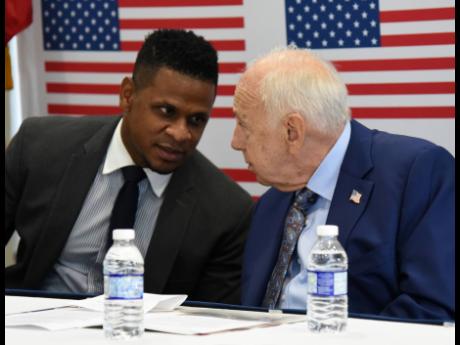Deal to crack down on port smuggling close, says Tapia
A long-gestating pact between Jamaica and the United States to stamp out corruption at local ports is almost ready for ratification but will probably not be inked until after the September 3 general election.
The stalled four-year talks may also allow for the use of intercepted communications or wiretapped conversations because “the fact is that’s how most of the information today is transmitted”.
The assertion was made by Donald Tapia, the US ambassador, at a media round table at the embassy in Kingston on Thursday.
Domestic ports have been widely described as sieves through which contraband, including guns and drugs, flow into the country, although the country’s roughly 250 informal ports have also been fingered as the playgrounds of traffickers.
Tapia said that it is likely that the memorandum of understanding (MOU) would be signed in the latter half of September.
“It might be before the elections, but the ministers are out in the constituencies, so I would venture to say after the elections,” he said, referencing the ramped-up election campaign.
The proposed MOU, according to Tapia, would allow American intelligence and customs authorities to partner with local law enforcement to build cases against key actors involved in the shipment of contraband into the island.
The ambassador said that the actual MOU documents could reach his desk at the embassy on Friday before being sent back to Washington, DC, for the attorneys to review and then return the 20-page document to the Jamaican Government for final approval.
“But of course, since the Parliament is dissolved, I think it will take a little time, but I believe it has been passed. It has been to Cabinet, so I believe we will sign the MOU any time after it is received back here,” said Tapia.
The ambassador noted that the “CMMA agreement” will actually help on corruption issue at the ports.
“We can always point to corruption, no matter where we look, but how in-depth is it? Illicit goods coming through the ports, narcotics coming through the ports, we are aware of that, but we are also aware that the Port Authority itself has ordered some security measures,” he said.
Soft targets
Tapia hinted at possible soft targets, saying that “the security agents down there” may not have been rigidly vetted.
He said that the Port Authority might already be testing their officers and using similar questions and technique used on polygraph.
Tapia said several points on the south and north coasts of island are being used as trans-shipment points.
National Security Minister Dr Horace Chang has said that about 2,400 illegal guns flow into Jamaica each year.
“The guns that are coming into Jamaica, you would think are all coming in through the ports. That is not true,” said Tapia.
“There are other countries that are actually securing guns in the US and transporting them to their country, and these are actually coming into Jamaica, 10, 15, 20 guns at a time.
Tapia also suggested that the majority of guns were “actually coming from another country but they are American-made guns,” he said.
That unnamed third party is perhaps Haiti, which has long featured, according to the police, in a barter-based trans-shipment culture.
Tapia said further that US authorities are “dead set” on making it difficult for gun smugglers to transport illegal weapons out of that country and into Jamaica, noting it will involve the full support of the Jamaica Constabulary Force and the Jamaica Defence Force.
In June, Attorney General Marlene Malahoo Forte had sidestepped questions about the proposed MOU and sticking points for the Holness administration, as well as the precise nature of the disagreement.
The focus of American authorities on the Jamaican ports, Tapia once explained, is fuelled by the ease with which illicit items such as guns and drugs enter the island.

